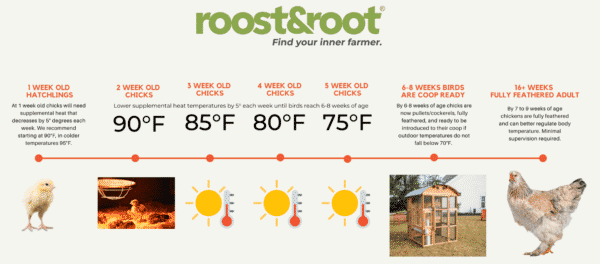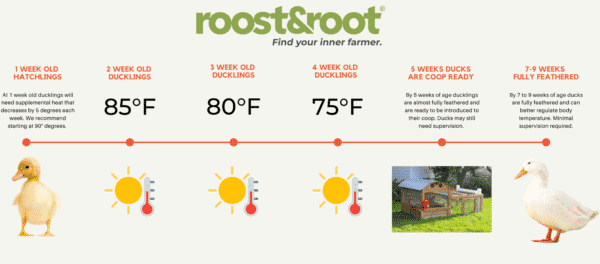
Deciding to raise backyard chickens is an exciting decision and journey to begin. Perhaps you’re debating on which flock members you want to begin with or maybe you already have a few chicks growing happily in a brooder. Regardless of which situation you may find yourself in, you’re likely contemplating how and when you should prepare your flock’s future coop. After all, they can’t live inside your home forever rent-free!
To help with your flock’s future relocation, we’ve compiled a small blog of helpful information to guide you on everything you need to know when it comes time to transition from brooder to your new Round-Top Coop. You may find that you won’t need your coop as soon as you believe you do!
Age:
As you may already suspect, your small flock members will eventually outgrow the palm of your hand. In what sometimes seems like overnight, your birds will transition from their fluffy coats to gleaming structured feathers. Chickens will go through 3 stages of growth by the time they are ready to transition outdoors: chicks, pullets/cockerels, and mature hens & roosters.
Chicks:
As seen on the chart below, your birds are considered chicks when they are 1 to 4 weeks old. At this age, your birds will require the most supervision and care. Chicks are recommended to stay in brooder set-ups to protect them from injury and to help regulate their body temperature.
If you’re new to brooding chicks, we recommend visiting our following blog post “Chick Brooder Set-Up Guide for Beginners” which shares everything you need to know about preparing a brooding space for chicks.
Pullets/Cockerels:
At 5-6 weeks of age, most of your bird’s body will be covered by growing adult feathers. At this stage, flock members are much less susceptible to drops in outdoor temperatures.
A rule of thumb to ensure that your flock members can comfortably use their Round-Top coop features is to transition your birds between 6 to 8 weeks of age. Transitioning birds any sooner may lead to an outside risk of safety regardless of their coop.
Fully Feathered Hens & Roosters:
Pullets and cockerels are not considered to be mature until they reach 16 weeks of age. A pullet is considered a hen when she finally begins to lay, which is around 18 weeks of age. Roosters are recognized as mature once their crow becomes more audible and their spurs are at least an inch long.
Outdoor Temperature:
Depending on your location and when you begin your backyard farming journey, the temperature should always be considered prior to your flock’s age. Chicks are able to withstand 5° temperature drops each week from the moment they are born, with consideration that they start with supplemental heat of 90°F or if outdoor temperatures are cold 95°F. Your flock is ready to be transitioned outside if by 6 weeks of age temperatures are steadily 70-65°F or higher. If temperatures are lower, we recommend keeping your birds indoors until they reach 8 weeks of age.
Once fully grown, your flock members can be very hardy to cooler temperatures. Temperature considerations are why it’s favored to begin backyard chicken keeping in the Spring and Summer months. Live in a state that experiences longer durations of warmth? Early Fall can be a considerably great time to start as well! If you often experience snow and freezing temperatures, we recommend utilizing our cold climate accessories.
Click/Tap to Expand Image
Breed:
Looking to start your flock with bantams? We recommend waiting to transition your bantam flock to our coops once they reach 8 weeks of age. If you need further guidance on how to care for and raise bantams, we recommend visiting our blog post “How to Raise and Keep Bantam Chickens”.
When Should Ducks go in a Coop?:
Considering a Round-Top Duck Coop? If you’re considering ducklings then it’s important to note that ducklings grow much much faster than chicks. Average-sized duck breeds are ready to enter their coops by 4 weeks of age if the weather outside is steadily warm and sunny (65°F). Ducks will fully feather at 7 to 9 weeks and begin laying at 5 to 6 months of age.
Click/Tap to Expand Image
We hope you find this article helpful as you begin or continue your backyard farming journey! If you ever have questions regarding anything mentioned in this blog post, reach out to us at 877-741-2667 or email us at support@roostandroot.com. We’re real people and are always happy to help!




